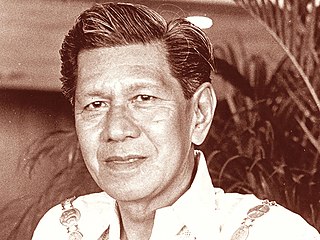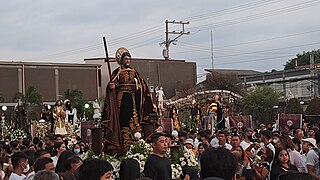
The Tikbalang (/ˈtikbaˌlaŋ/) is a creature of Philippine folklore said to lurk in the mountains and rainforests of the Philippines. It is a tall, bony humanoid creature with the head and hooves of a horse and disproportionately long limbs, to the point that its knees reach above its head when it squats down. In some versions, it is a transformation of an aborted fetus sent to earth from limbo.
Philippine English is any variety of English native to the Philippines, including those used by the media and the vast majority of educated Filipinos and English learners in the Philippines from adjacent Asian countries. English is taught in schools as one of the two official languages of the country, the other being Filipino. Due to the influx of Filipino English teachers overseas, Philippine English is also becoming the prevalent variety of English being learned in the Far East as taught by Filipino teachers in various Asian countries such as South Korea, Japan and Thailand, among others. Due to the highly multilingual nature of the Philippines, code-switching such as Taglish and Bislish is prevalent across domains from casual settings to formal situations.

Nicomedes "Nick" Marquez Joaquin was a Filipino writer and journalist best known for his short stories and novels in the English language. He also wrote using the pen name Quijano de Manila. Joaquin was conferred the rank and title of National Artist of the Philippines for Literature. He has been considered one of the most important Filipino writers, along with José Rizal and Claro M. Recto. Unlike Rizal and Recto, whose works were written in Spanish, Joaquin's major works were written in English despite being literate in Spanish.

Mexico, officially the Municipality of Mexico, is a 1st class municipality in the province of Pampanga, the Philippines. According to the 2020 census, it has a population of 173,403 people. It was also formerly known as Nuevo México during the Spanish period.
The Juan de la Cruz Band was a Filipino rock group formed in 1970, that pioneered what became known as Pinoy rock.

Fernando Amorsolo y Cueto was a portraitist and painter of rural Philippine landscapes. Nicknamed the "Grand Old Man of Philippine Art," he was the first-ever to be recognized as a National Artist of the Philippines. He was recognized as such for his "pioneering use of impressionistic technique" as well as his skill in the use of lighting and backlighting in his paintings, "significant not only in the development of Philippine art but also in the formation of Filipino notions of self and identity."
Postal addresses in the Philippines are similar in format to those in many other parts of the world. They are especially used to locate areas in the Philippines.

Salakót is a traditional lightweight headgear from the Philippines that is commonly used during pre-colonial era up to the present day, used for protection against the sun and rain. Every ethnolinguistic group in the archipelago has their own variant, but they are all usually dome-shaped or cone-shaped and can range in size from having very wide brims to being almost helmet-like. They are made from various materials including bamboo, rattan, nito ferns, and bottle gourd. The tip of the crown commonly has a spiked or knobbed finial made of metal or wood. It is held in place by an inner headband and a chinstrap. The salakot hat also influenced the pith helmet used by European colonizers. Salakot or also spelled as salacot in Spanish and salacco in French is the direct precursor to the pith helmet widely used by European military forces in the colonial era.

Erika Chryselle Gonzales Gancayco-Lorenzo, better known by her stage name Erich Gonzales, is a Filipino actress. She is a contract artist of ABS-CBN's Star Magic. She started her showbiz career at the age of 14, as a contestant of the reality talent search Star Circle Quest. She came to prominence in her lead role Katorse.

The baro’t saya or baro at saya is a traditional dress ensemble worn by women in the Philippines. It is a national dress of the Philippines and combines elements from both the precolonial native Filipino and colonial Spanish clothing styles. It traditionally consists of four parts: a blouse, a long skirt, a kerchief worn over the shoulders, and a short rectangular cloth worn over the skirt.
The Arts in the Philippines are all the arts in the Philippines, from the beginning of civilization to the present. They reflect a range of artistic influences on the country's culture, including indigenous art. Philippine art consists of two branches: traditional and non-traditional art. Each branch is divided into categories and subcategories.
Anthony Bryan Davis dela Cruz is a Filipino-American former professional basketball player and coach. He played majority of his career for the Alaska Aces of the Philippine Basketball Association (PBA), where he also served as an assistant coach after his playing career. He is also a former member of the RP National Basketball Team.

Holy Week is a significant religious observance in the Philippines for the Catholic majority, the Iglesia Filipina Independiente or the Philippine Independent Church, and most Protestant groups. One of the few majority Christian countries in Asia, Catholics make up 78.8 percent of the country's population, and the Church is one of the country's dominant sociopolitical forces.

Panday Kids is a 2010 Philippine television drama fantasy series broadcast by GMA Network. The series is a television sequel to the 2009 film Ang Panday. Directed by Mike Tuviera and Dominic Zapata, it stars Sabrina Man, Buboy Villar and Julian Trono. It premiered on February 22, 2010 on the network's Telebabad line up replacing Darna. The series concluded on June 4, 2010 with a total of 72 episodes. It was replaced by Pilyang Kerubin in its timeslot.

The Philippine women's national rugby sevens team, known as the Volcanoes, represents the Philippines in rugby sevens. They played their first international sevens in 2010 at the Asian Championships. They won the 2019 Asia Rugby Women's 7s Trophy Series in Indonesia.

The Alex Boncayao Brigade was the urban assassination unit of the New People's Army, the armed wing of the Communist Party of the Philippines. Organized in 1984, the unit broke away from the New People's Army as a consequence of a split in ideology during the 1990s. In 1997, the Alex Boncayao Brigade allied itself with the Revolutionary Proletarian Army, the armed wing of the Revolutionary Workers' Party.
The kidnapping of Angelo dela Cruz, a Filipino Overseas Filipino Worker working in Iraq, is an event that led to the withdrawal of Filipino soldiers from the Multi-National Force – Iraq, a United States-led multinational coalition which was a participant in the Iraq War.
The Philippines Free Press is a weekly English language news magazine which was founded in 1908, which makes it the Philippines' oldest weekly English language periodical currently still in print. It is known for being one of the few publications that dared to criticize the administration of Ferdinand Marcos in the years before the declaration of Martial Law, and for being one of the first publications shuttered once Martial Law was put into effect. It has been revived after Marcos was ousted. The magazine was known for featuring the outstanding legislators every year. Only Jose W. Diokno has held the title for four consecutive years, which is the most in the magazine's award giving history.













